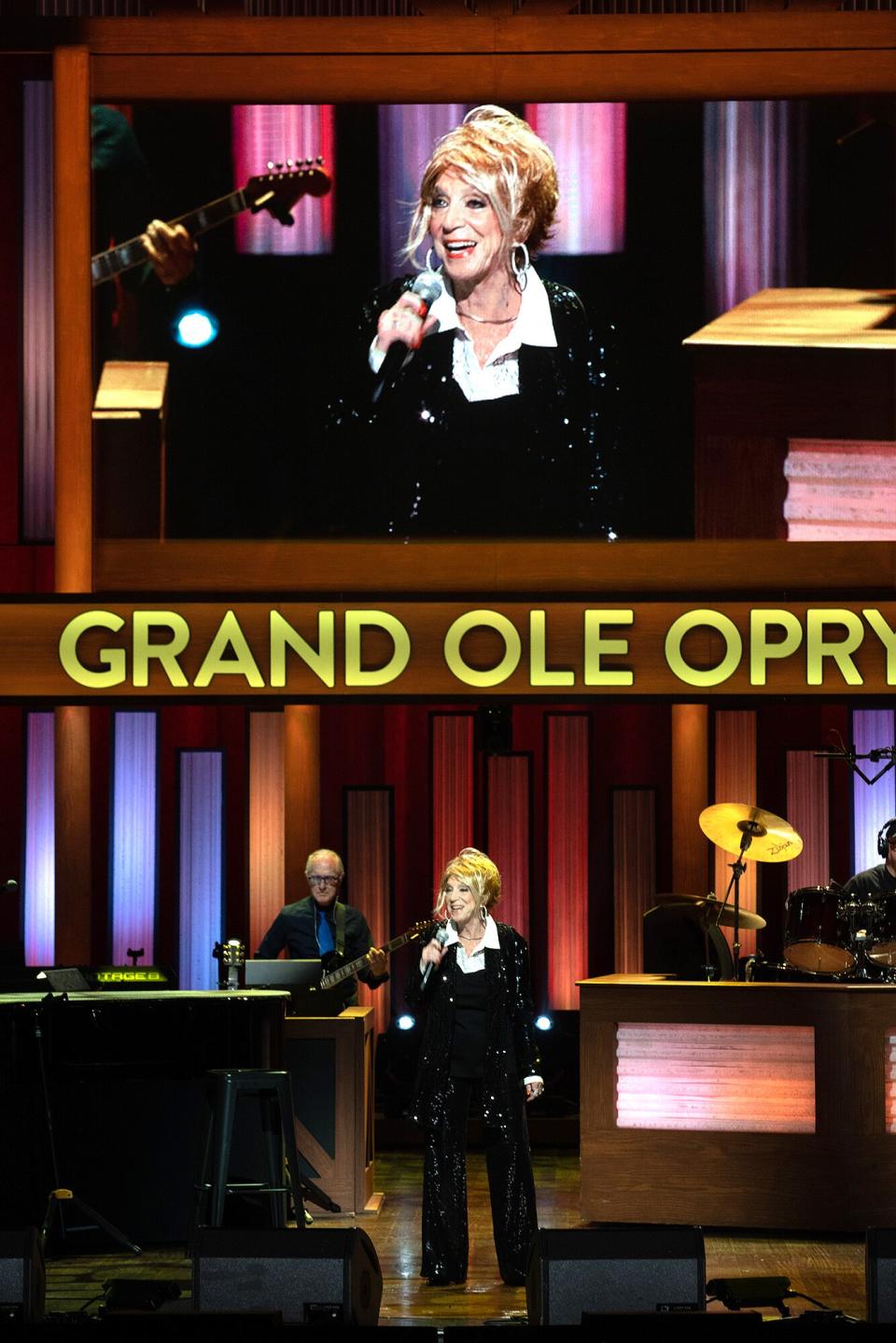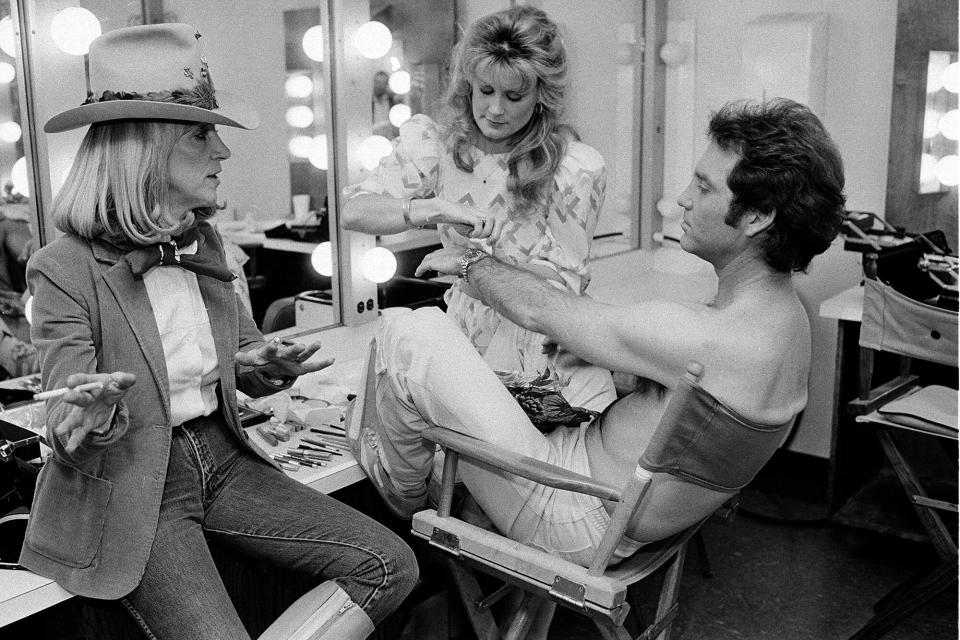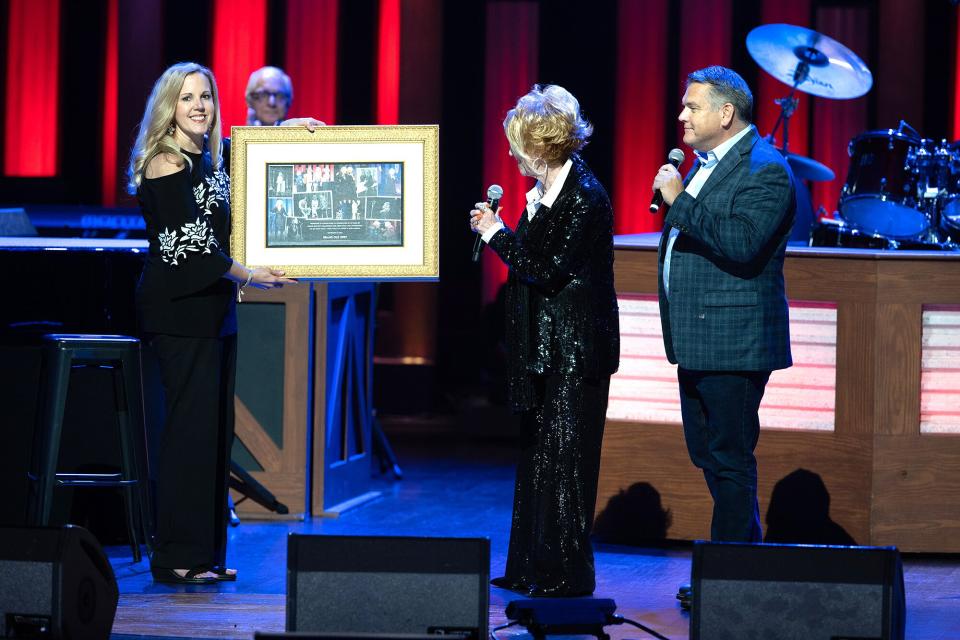She's an Opry Record-Setter: Jeannie Seely Celebrates Over 5,000 Performances on Country's Most Famous Stage

Chris Hollo Jeannie Seely
Jeannie Seely can trace her first memories of the Grand Ole Opry back to when she was just 4 years old. Growing up in tiny Townville, Pennsylvania, she and her family would huddle around the radio on Saturday nights to listen to the popular show. She loved it so much that, during the week, she kept trying to dial it in on the radio.
"I thought I should get the Opry," the Grammy-winning country artist tells PEOPLE.
Almost eight decades later, that little girl's wish — a life filled with the Opry — has come true beyond her wildest dreams, for no one more than Seely represents the heart and soul of what is perhaps country music's most hallowed institution.
This month Seely celebrated 55 years as an Opry member — a remarkable accomplishment, to be sure — but it pales in comparison to another number. Since her first appearance on the Opry's Nashville stage on May 28, 1966, Seely has been on the show an astonishing 5,200 times-and-counting. The number just keeps going up since she still appears on the Opry two to three times a week, and she has no plans to stop.
In anticipation of her anniversary, Opry historian Byron Fay was able to confirm that Seely holds the indisputable record for most Opry performances — and no one was more amazed by the feat than the record-holder herself.
"I was blown away," says Seely, 82. "It's like, you're kidding me."
Fay reports that Seely's remarkable Opry run actually began in earnest in January 1968, which is when he chose to start his count. Since then, the Opry has mounted 9,600 shows, and Seely has appeared in almost 55 percent of them. (The Opry stage goes live on Friday and Saturday nights, and a mid-week show was added several years ago.)
In between her Opry performances, Seely also has enjoyed a full career as a touring performer, recording artist, songwriter, actor, disc jockey, and most recently, a radio host on the Willie's Roadhouse channel of SiriusXM. She notched a string of hits from the late 1960s through the 1970s and has recorded 20 albums, including her latest, 2020's An American Classic. Her Grammy, for debut single "Don't Touch Me," was awarded in 1966 for best country performance by a female, and she's also received multiple CMA nominations.
No doubt the Opry benchmark is destined to be among her most celebrated accomplishments. But as impressive as the record is, it still doesn't fully express Seely's rarefied role at the Opry, the history she's witnessed or the history she's made over the years.
She arrived in Nashville in October 1965 intent on a career as a singer-songwriter, but she also had single-mindedly set her sights on the Opry. "Actually, I knew at 8 years old what I wanted to be," Seely says. "And I knew I wanted to be at the Opry."
She didn't just want to be on its stage. Since childhood, she'd reveled in the camaraderie she heard among its cast members, many of whom are now Hall of Fame icons: Roy Acuff, Minnie Pearl, Ernest Tubb, Kitty Wells, Little Jimmy Dickens, Jean Shepard, among others. "I just wanted to know them," Seely says. "I wanted to be a part of that family that I heard every week."
As "Don't Touch Me" began to take off on radio, Seely says she finally managed to attract a coveted Opry invitation. The first time she set foot onstage was her first visit to the Opry; she'd been too busy touring to even take in a show.
She remembers that first time with awe; many of the stars she'd grown up with, including Acuff and Minnie Pearl, were still headlining presences. "I was standing shoulder to shoulder in the wings with all my heroes," she says. "I had never even seen them in person anywhere — even across the footlights."

Mark Humphrey/AP/Shutterstock Jeannie Seely, left, talks with Larry Gatlin in his dressing room as Genie Bellar applies the final touches of his makeup
A little more than a year later, on Sept. 16, 1967, she sealed her future with the Opry when she was inducted as a member. It's a coveted honor that, to date, has been bestowed on just 230 acts in the Opry's 97-year history. For Seely, it was more than an honor; it was a covenant. Membership guarantees artists will always have a stage, no matter the season of their career, and Seely has returned this privilege with an unprecedented commitment to performing there.
"The Opry is just simply a way of life to me," she says.
RELATED: Finally a Grand Ole Opry Member, Carly Pearce Celebrates with Happy Tears: 'Best Night of My Life'
That life has left her with a lifetime of memories. She knows firsthand that Minnie Pearl, country's most famous comedian, was actually funnier offstage than on. She can quote the advice she received from both Tubb and Porter Wagoner: "Ernest always said, 'Be ready and hit that stage performing.' Porter was a little less subtle. He always said, 'Hell, ma'am, when they call your name, do something!"
She's also among the few remaining active Opry members who performed at the historic Ryman Auditorium when it was the show's home from 1943 to 1974. When the Opry moved to its permanent location, the Grand Ole Opry House, Seely welcomed the change.
"I was just thrilled that they finally considered the Opry important enough to have a home of its own," she says.
The move included sawing out a circle from the Ryman's floorboards and installing it center stage at the new Opry House, turning it into country's most sacred real estate. Seely embraced the gesture as a symbol of continuity, but she's also amused now when people ask what it means to perform inside the circle.
"Well, they're the boards of the Ryman that used to cover the whole stage I was on," she quips.
Known for her quick wit and feisty spirit, Seely also has taken a prominent role over the years as a vocal advocate for progress, especially for the Opry's women. From the start, she hasn't shrunk from butting heads in the often-hidebound institution.
When she arrived at the Opry in 1966, female artists were still abiding by an unwritten dress code of gingham and long, ruffled skirts. Seely showed up in a miniskirt, slipped off her coat and went on stage before anyone could stop her. Afterward, Opry manager Ott Devine called her on the carpet. Seely held her ground.
"I explained that I just moved here from California, and this is what everybody's wearing," says Seely, noting (righteously) that the skirt hit just above the knee. "I said, 'You do know the trend is coming,' and finally, just jokingly, I said, 'Okay, I'll make you a deal. I won't wear any in the back door if you don't let anybody come in the front door wearing them because it's gonna happen.' And he was like, 'Well, okay. But just try to hold it down.'"
Other women soon began to follow Seely's example. "They weren't locked into ironing those damn ruffles!" she exults.
Seely also helped lead the drive to allow female members to host Opry segments, an honor long reserved for men. In 1985, she became the first woman to host a segment, but only because the male host had been caught in a Nashville snowstorm, and she was the only Opry member present. Her push for the privilege continued until change finally came with the arrival of new management in 1993.
"I would go through and bring up the same points and always get told it was tradition or whatever," she recalls. "My point was, it was not just to promote women. I have always looked at the overall show. To me, of course, the ratio was about one-third female and two-thirds male on the roster. They were wasting a good part of the talent pool by not letting women say anything. We were given very little opportunity to talk, and also you're ignoring at least half of your audience because who decided women were willing to buy a ticket, but they only wanted to hear men talk? Made no sense to me."

Chris Hollo Jeannie Seely
Seely expresses a special kinship with what she calls her "Opry sisters," the other female members who have formed a circle inside the Opry's already tight-knit circle. Among her original sisterhood she lists Connie Smith, Jean Shepard, Jan Howard, Tammy Wynette, and her closest friend, Dottie West.
Perhaps Seely's saddest Opry memory occurred the night of Aug. 30, 1991: She'd already been onstage when she heard the news that West had been in a horrific car accident on her way to the Opry.
"I was, of course, just devastated," she recalls about that dark day. "Everybody was just in shock."
West clung to life for five days before succumbing to her injuries; Seely kept a sad vigil at the hospital. The funeral was held three days later, and the Opry asked Seely to host its TV show that evening in tribute to her friend.
"I'm like, I don't know if I can," Seely recalls. "And then they said, 'You've got to. You're just the obvious one.' And so I had to rechannel my mind to saying, you've been so frustrated for the last week, saying you couldn't do anything. You've been given something to do now. So, there is something you can do for her now."
In recent years, Seely has enjoyed taking the Opry's newest female members under her wing, adding them to her sisterhood, and urging them to stand their own ground as she has done. She recently cornered Lauren Alaina, who was inducted in February, to impress upon her certain responsibilities.
"I went in the dressing room, and after we'd hugged, I had her shoulders, and I'm like, 'Lauren, I want you to promise me something,'" Seely recalls. "And her eyes were this big. She said, 'Sure. What is it, Miss Jeannie?' And I said, 'I want you to promise me that you will carry on this bulls— for me when I'm gone. I'm counting on you.' And she said, 'I can do it!'"
Seely follows the story with quick assurances that her last day won't be any time soon. She's enjoying the Opry life now more than ever, and she's more determined than ever to help usher the Opry into the future: "I can't think of anything worse than the Opry going down in my era."
Perhaps better than anyone else, she understands that its role in country music is too singularly important for it to wither away. But something else also motivates her to give her best every night she takes the stage of the world's longest-running radio show.
"Somewhere," Seely says, "there's a little girl listening who wants to be there as badly as I did."

 Yahoo Finance
Yahoo Finance 